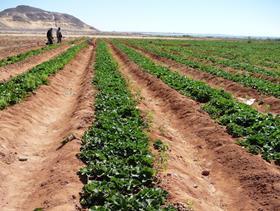
The future success of Egyptian agriculture lies in shifting production further south, towards the area known as Upper Egypt, according to Douglas Anderson, formerly active in a number of USAID economic growth projects in Egypt and managing partner of Cairo-based Anderson Associates International (AAI), a US organisation that has been involved in international consultancy and development since the Second World War.
The idea, as he sees it, is to take advantage of Egypt’s varied climate in order to extend the seasons of products including grapes, strawberries and a host of other commodities with export potential for both fresh-pack and processed foods.
“If Egypt is going to continue to develop its strawberry production, growers will need to move south,” said Anderson. “The same is true for grapes. Grapes and strawberries underpin the rest of Egypt’s fresh-pack exports, and by moving south to Upper Egypt, we think the season can be brought forward by 2-4 weeks, depending on the product. This is a huge competitive advantage.”
For many items, Upper Egypt is a perfect match for Europe in terms of seasonality, said Anderson. In addition to grapes and strawberries, he suggested green beans, Galia melons, onions, garlic, herbs, cauliflower, broccoli and tomatoes (for processing) could be ideal for production in the region.
“Egypt is one of the biggest tomato producers in the world, but the country didn’t really export tomato paste, as growers were planting the wrong varieties,” said Anderson. “So we conducted some varietal tests and picked 6-7 more suitable varieties. This extended the harvesting window from around 90 days to 255 days for processors.”
In the Middle East and North Africa region, AAI executives have directed growth in the food processing and primary production sectors for 17 years, increasing processed food exports from US$62m to over US$3bn and the fresh-pack sector from US$26m to almost US$2bn, said Anderson.
“We accomplished this by improving production economics, product development and line extension, and improving packaging and labelling led by market intelligence,” he explained. “We developed and obtained over US$2bn in funding for agribusiness projects and restructured the tomato paste industry by introducing new cultivars that improved product quality and reduced conversion costs exponentially. This attracted investment in 12 new tomato processing plants in the country and resulted in Egypt being a net exporter of tomato paste for the first time in its history.”
According to Anderson, AAI’s role, put simply, is to bring small growers together in order to boost their combined potential. “Around 90 per cent of Egyptian farmers own 1.2ha or less,” he said. “The big exporters don’t know how to work with such small farmers. That’s where we come in. We’re good at aggregating growers.”
But it is not all plain sailing. The biggest issue in Upper Egypt, said Anderson, is the lack of a cold chain. “So in the summer you have to go for crops that travel well like sesame seeds, groundnuts and sunflowers,” he said. “But you’ve got year-round growing conditions in Egypt. The seasons complement each other within the country.”
In terms of export markets, Egypt is equally well placed. “Egyptian exporters can reach 1.4bn consumers,” said Anderson, “in India, the Gulf, North Africa, West Africa. Around 80 per cent of produce into West Africa is actually distributed in sub-Saharan Africa, excluding South Africa. Libya was a huge supplier to West Africa, but not at the moment, so this is a huge opportunity for Egypt. Egyptian fresh-pack and processed food companies export to over 80 countries, yet such opportunities remain unfulfilled due to a lack of raw materials at critical periods when Upper Egypt could step in to meet demand.”
The future certainly looks positive for Egypt, given the growing stability in the country and recent developments like the expansion of the Suez Canal. The World Bank also estimates that around US$200bn is currently held by Egyptian citizens outside the country, and Anderson fully expects such money to come flooding back when the situation stabilises further.






No comments yet